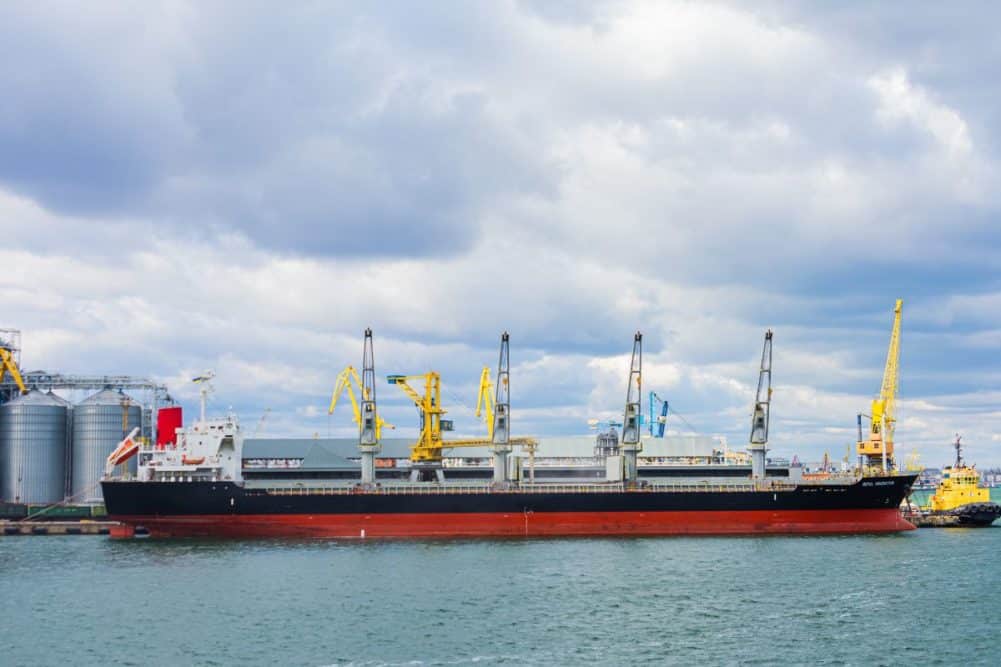
Russia announced on July 17 it was suspending its participation in the Black Sea Grain Initiative which for nearly a year has allowed safe passage of Ukraine grain exports via the Black Sea in the midst of a war between the two countries.
The deal, which was brokered by the United Nations and Turkey, was set to expire at 5 p.m. today. The last shipments from Ukraine departed from the Port of Odesa on July 16.
Russia invaded Ukraine on Feb. 24, 2022, and during the first five months of the conflict blockaded Ukrainian ports which prevented Ukraine, a leading exporter of wheat, corn and sunflower oil, from making shipments via the Black Sea. Grain prices during that period soared to near-record highs and food insecurity, especially in developing countries, reached critical levels. An agreement was reached on July 27, 2022, to resume Ukrainian grain exports and the deal was extended several times until Russia announced on Monday that it was suspending its participation.
Kremlin spokesman Dmitry Peskov told reporters on Monday that the Black Sea agreements are no longer valid.
“Unfortunately, the part of these Black Sea agreements concerning Russia has not been implemented so far, so its effect is terminated,” he said.
Russia in recent weeks had threatened to not extend the deal unless a series of demands, including the removal of obstacles to Russian grain and fertilizer exports, were met. The United Nations has proposed reconnecting a Russian agricultural bank to the SWIFT international payment system in exchange for Russia extending the Black Sea Grain Initiative, according to a Reuters report. Sources told Reuters that UN Secretary-General Antonia Guterres proposed that Rosselkhozbank be reconnected to the network, which was cut off by the European Union in June 2022 following Russia’s February invasion of Ukraine.
More than 33 million tonnes of grain and other foodstuffs have been shipped from Ukrainian ports since the blockade was lifted a year ago, according to the United Nations.
When news of the suspended agreement broke in the early morning hours of July 17, Chicago Board of Trade wheat futures rose sharply to $6.86 a bushel in a matter of minutes, having closed at $6.61 on July 14. However, the price dropped steeply just before the market opened and fell to $6.55 a half-hour after the market opened, nearly a 1% decline.
Stephen Nicholson, Rabobank’s senior global strategist for Grains and Oilseeds, told World Grain that the market’s sharp decline just before the market opened was perhaps due to buyers expecting it to happen and anticipating Russia will resume the deal quickly.
“The market has been anticipating this for quite some time, so it doesn’t come as a surprise,” he said. “Also keep in mind that buyers have been anticipating this as well, so they either stocked up or made sure their alternative supply channels are functioning well. In addition, Russia has been slowing inspections for several months, so limited vessels have been coming out of the Black Sea anyway and vessel owners have been removing ships from the Black Sea over the last several weeks in anticipation of the agreement being canceled.
“However, that will only last so long until buyers will have to come back to the market and if global wheat supplies tighten due to production issues, we could very well see this market snap back.”
If the suspension of the agreement is prolonged, it remains to be seen to what extent Ukraine can maximize its ability to export grain through other means. Since the invasion in February 2022, Ukraine has increased its ability to ship grain from three inland ports on the Danube River. In the past year, Ukraine has increased grain shipments on this route from a few hundred thousand tonnes to 2 million annually, according to the Ukrainian Grain Association, which noted that there is potential to double that figure.
The country has also made efforts to boost its grain shipments by truck and rail through Europe.
However, Vladyslava Magalestska, former deputy minister of food and agriculture for Ukraine, told World Grain that even with the improvements made on the Danube River, it can’t replace the volume of grain that is shipped via the Black Sea.
“It’s a quite small amount compared to the southern ports,” she said. “It’s not enough.”
The announcement of the withdrawal came just hours after a blast knocked out Russia’s bridge to Crimea in what Moscow called a strike by Ukrainian sea drones. Russia said two civilians were killed on the road bridge, a major artery for Russian troops fighting in Ukraine. However, Russian officials said there was no link between the attack and its decision to suspend the grain deal.
While it is unclear whether Russia would now attack ships carrying agricultural and food products leaving Ukraine’s southern ports, war risk insurance premiums, which are renewed every seven days, will likely rise.
